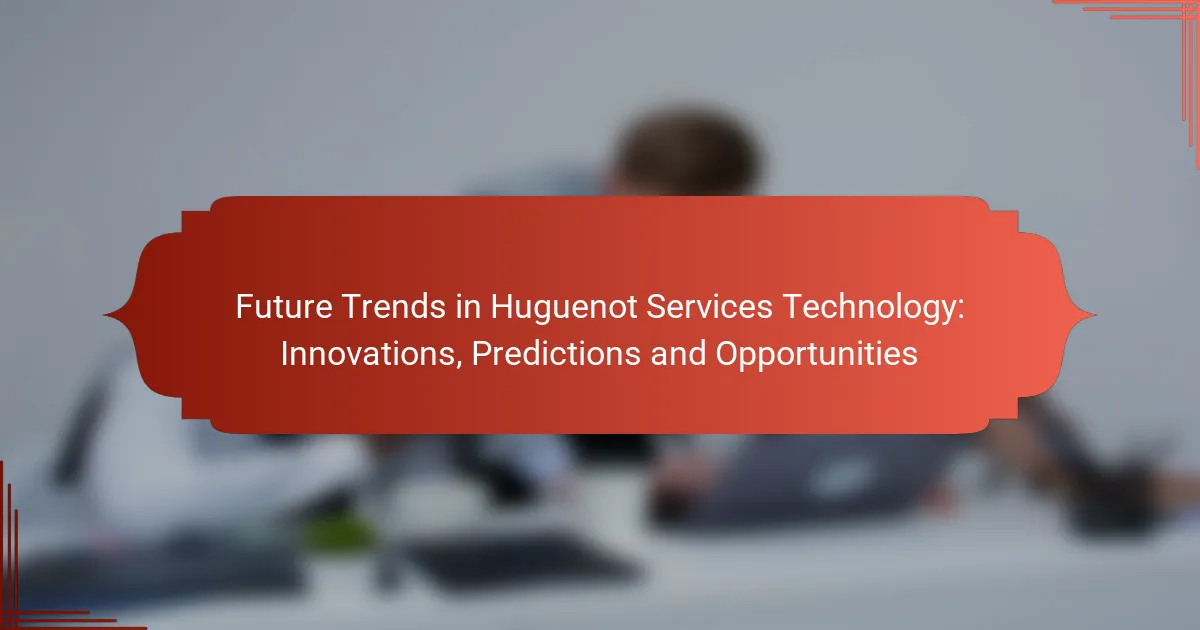The future of Huguenot services technology is poised for transformation through the adoption of cutting-edge innovations such as artificial intelligence, blockchain, and augmented reality. These advancements not only enhance service delivery and customer engagement but also open up new avenues for businesses to thrive. As the sector evolves, particularly in regions like Ireland, the integration of cloud solutions and IoT devices will further improve efficiency and create exciting opportunities for growth.
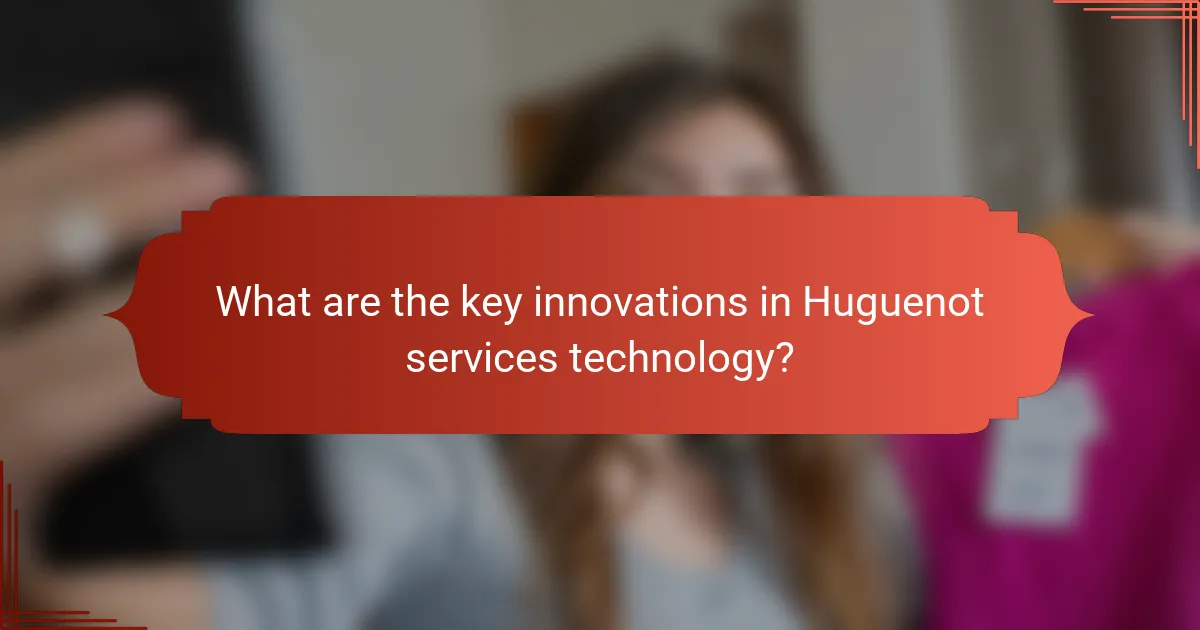
What are the key innovations in Huguenot services technology?
Key innovations in Huguenot services technology include the integration of advanced tools like artificial intelligence, blockchain, and augmented reality. These technologies enhance service delivery, secure transactions, and improve customer engagement, respectively, creating new opportunities for businesses and consumers alike.
Artificial Intelligence in service delivery
Artificial intelligence (AI) is transforming service delivery by automating processes and personalizing customer interactions. AI can analyze customer data to predict needs and preferences, allowing businesses to tailor their services effectively.
For instance, chatbots powered by AI can handle customer inquiries 24/7, providing instant responses and freeing up human agents for more complex issues. Companies should consider implementing AI solutions that align with their service goals and customer expectations.
Blockchain for secure transactions
Blockchain technology offers a decentralized and secure method for conducting transactions, which is crucial for maintaining trust in Huguenot services. By using blockchain, businesses can ensure that all transactions are transparent and tamper-proof.
For example, smart contracts can automate agreements between parties, reducing the need for intermediaries and minimizing costs. Organizations should evaluate the integration of blockchain to enhance security and efficiency in their transaction processes.
Augmented Reality for customer engagement
Augmented reality (AR) enhances customer engagement by providing immersive experiences that blend digital content with the real world. This technology allows customers to visualize products or services in their environment before making a purchase.
For instance, AR applications can enable users to see how furniture would look in their home or how a product fits their lifestyle. Businesses should explore AR solutions that can create interactive experiences, ultimately driving customer satisfaction and loyalty.
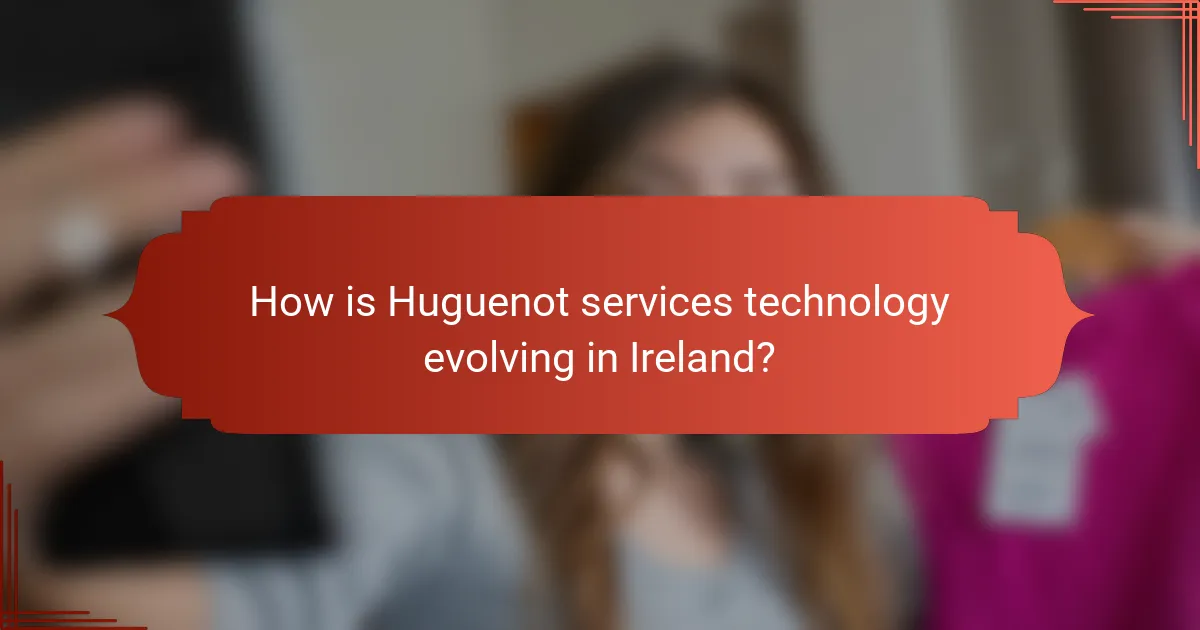
How is Huguenot services technology evolving in Ireland?
Huguenot services technology in Ireland is evolving through advancements in cloud solutions and the integration of Internet of Things (IoT) devices. These innovations are enhancing service delivery, improving efficiency, and expanding opportunities for businesses and consumers alike.
Increased adoption of cloud solutions
The adoption of cloud solutions in Huguenot services is transforming how organizations manage data and deliver services. By utilizing cloud platforms, businesses can access scalable resources, reduce operational costs, and improve collaboration among teams.
Organizations should consider transitioning to cloud-based systems to enhance flexibility and security. Popular cloud providers offer various services, including data storage, analytics, and application hosting, which can be tailored to specific business needs.
Integration of IoT devices
Integrating IoT devices into Huguenot services technology allows for real-time monitoring and data collection, leading to more informed decision-making. These devices can track everything from service usage patterns to equipment performance, providing valuable insights.
Businesses should evaluate the types of IoT devices that can enhance their operations, such as smart sensors or connected machinery. However, it is crucial to ensure robust cybersecurity measures are in place to protect sensitive data transmitted by these devices.

What opportunities exist for businesses in Huguenot services?
Businesses in Huguenot services can tap into various opportunities by leveraging technology and market trends. Key areas include expanding into new markets and forming partnerships with tech startups to enhance service offerings and improve operational efficiency.
Expansion into new markets
Expanding into new markets allows Huguenot service providers to reach a broader customer base and increase revenue. Companies should consider regions with growing demand for their services, such as urban areas with a high concentration of potential clients.
To successfully enter new markets, businesses should conduct thorough market research to understand local preferences and regulations. Tailoring services to meet specific cultural or regional needs can significantly enhance acceptance and success rates.
Partnerships with tech startups
Forming partnerships with tech startups can provide Huguenot services businesses with innovative solutions and access to cutting-edge technology. Collaborations can lead to improved service delivery, enhanced customer experiences, and operational efficiencies.
When considering partnerships, businesses should evaluate the startup’s technology and its alignment with their service goals. Establishing clear objectives and mutual benefits is crucial for a successful collaboration, ensuring both parties gain value from the relationship.
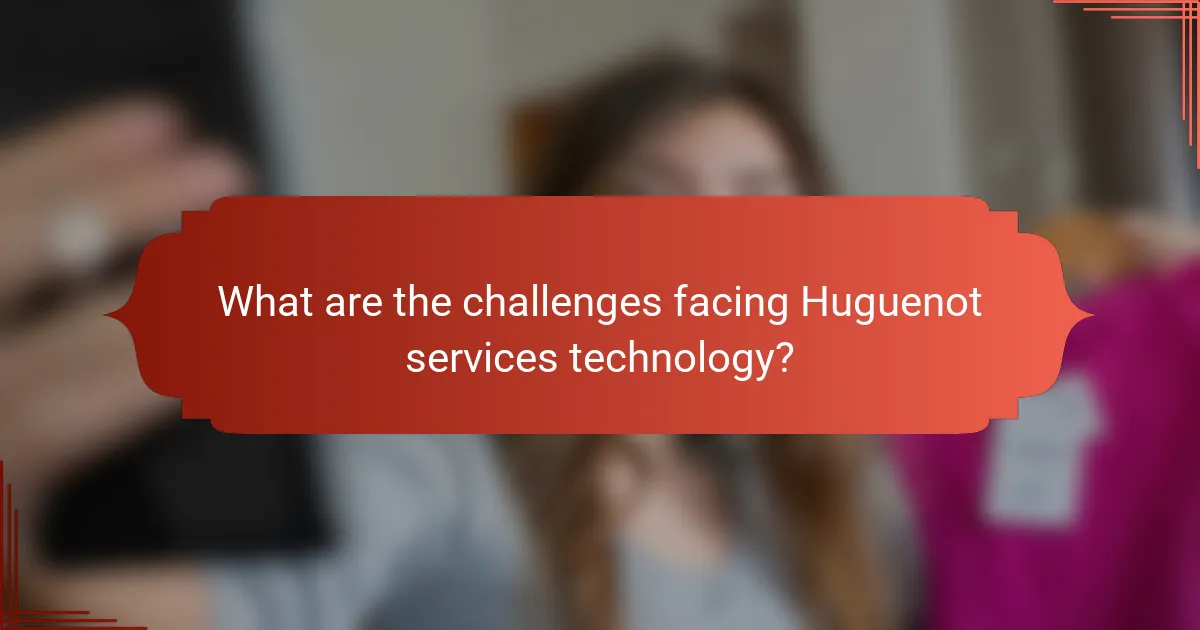
What are the challenges facing Huguenot services technology?
The challenges facing Huguenot services technology primarily revolve around data privacy, regulatory compliance, and the need for continuous innovation. As technology evolves, these issues become more complex, requiring organizations to adapt their strategies to ensure secure and compliant service delivery.
Data privacy concerns
Data privacy concerns are paramount in Huguenot services technology, as organizations handle sensitive personal information. Ensuring that customer data is protected against breaches and unauthorized access is critical. Implementing robust encryption methods and regular security audits can help mitigate these risks.
Organizations should also be transparent about their data collection practices. Clear privacy policies and user consent mechanisms are essential to build trust and comply with regulations like the General Data Protection Regulation (GDPR) in Europe. Regular training for employees on data handling best practices can further enhance privacy protection.
Regulatory compliance issues
Regulatory compliance issues pose significant challenges in Huguenot services technology, as organizations must navigate a complex landscape of laws and regulations. Compliance with local and international standards, such as GDPR or the Health Insurance Portability and Accountability Act (HIPAA) in the U.S., is necessary to avoid legal repercussions.
To effectively manage compliance, organizations should conduct regular assessments of their practices against regulatory requirements. Developing a compliance checklist can help ensure that all aspects of service delivery meet necessary standards. Engaging legal experts or compliance officers can provide additional guidance and support in navigating these challenges.

How can businesses leverage emerging trends in Huguenot services?
Businesses can leverage emerging trends in Huguenot services by adopting innovative technologies and strategies that enhance customer engagement and operational efficiency. Focusing on predictive analytics and customer feedback loops can significantly improve service delivery and client satisfaction.
Utilizing predictive analytics
Predictive analytics involves using historical data and statistical algorithms to forecast future outcomes. In Huguenot services, this can help businesses anticipate client needs and optimize resource allocation. For instance, analyzing past service requests can reveal patterns that inform staffing decisions during peak times.
To implement predictive analytics effectively, companies should invest in data collection tools and analytics software. Establishing a baseline of key performance indicators (KPIs) can guide the analysis. Regularly reviewing these insights allows businesses to adjust strategies proactively, enhancing service quality and efficiency.
Implementing customer feedback loops
Customer feedback loops are essential for continuous improvement in Huguenot services. By actively seeking and analyzing client feedback, businesses can identify areas for enhancement and adapt their offerings accordingly. This approach fosters a culture of responsiveness and customer-centricity.
To create effective feedback loops, companies should utilize surveys, direct interviews, and online reviews. It’s crucial to act on the feedback received, demonstrating to clients that their opinions matter. Regularly updating clients on changes made based on their input can further strengthen relationships and loyalty.

What frameworks can guide the selection of Huguenot services technologies?
Frameworks for selecting Huguenot services technologies focus on evaluating cost, scalability, and user needs. These frameworks help organizations make informed decisions that align with their strategic goals and operational capabilities.
Cost-benefit analysis
Conducting a cost-benefit analysis is essential for assessing Huguenot services technologies. This involves comparing the total costs, including initial investment, maintenance, and operational expenses, against the expected benefits such as improved efficiency and customer satisfaction.
Consider using a simple formula: Total Benefits – Total Costs = Net Benefit. If the net benefit is positive, the technology may be worth pursuing. For example, if implementing a new service platform costs around $10,000 but is expected to save $15,000 annually, the investment is justified.
Scalability considerations
Scalability is crucial when selecting Huguenot services technologies, as it determines how well a system can grow with your organization. A scalable solution can handle increased demand without significant changes to the infrastructure or performance degradation.
Evaluate whether the technology can accommodate future growth in user numbers or service offerings. For instance, cloud-based solutions often provide better scalability compared to on-premises systems, allowing for flexible resource allocation based on current needs.
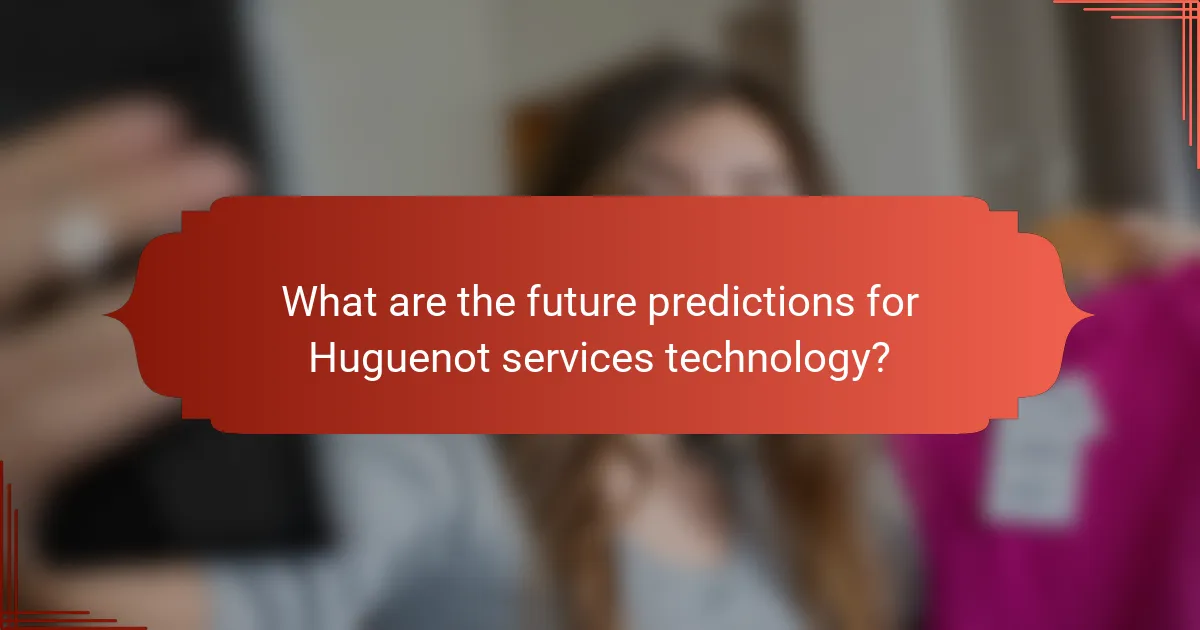
What are the future predictions for Huguenot services technology?
Future predictions for Huguenot services technology indicate a significant shift towards enhanced automation, improved customer engagement, and the integration of advanced analytics. These trends are expected to streamline operations, reduce costs, and enhance service delivery in the coming years.
Increased automation in service processes
Increased automation in Huguenot services technology will likely transform how services are delivered. Automation can handle repetitive tasks such as data entry, appointment scheduling, and customer inquiries, allowing human resources to focus on more complex issues that require personal attention.
Implementing automation tools can lead to faster response times and improved accuracy. For instance, chatbots can provide immediate assistance to clients, while automated scheduling systems can reduce the time spent on coordinating appointments. Organizations should consider the initial investment versus long-term savings when adopting these technologies.
Common pitfalls include over-reliance on automation, which can lead to a lack of personal touch in customer interactions. It’s essential to strike a balance between automated services and human engagement to maintain customer satisfaction.
